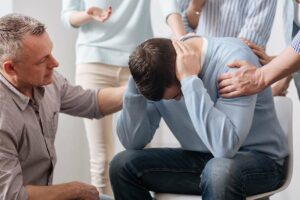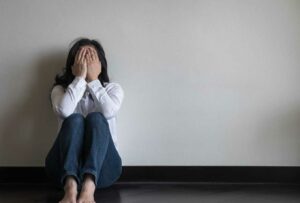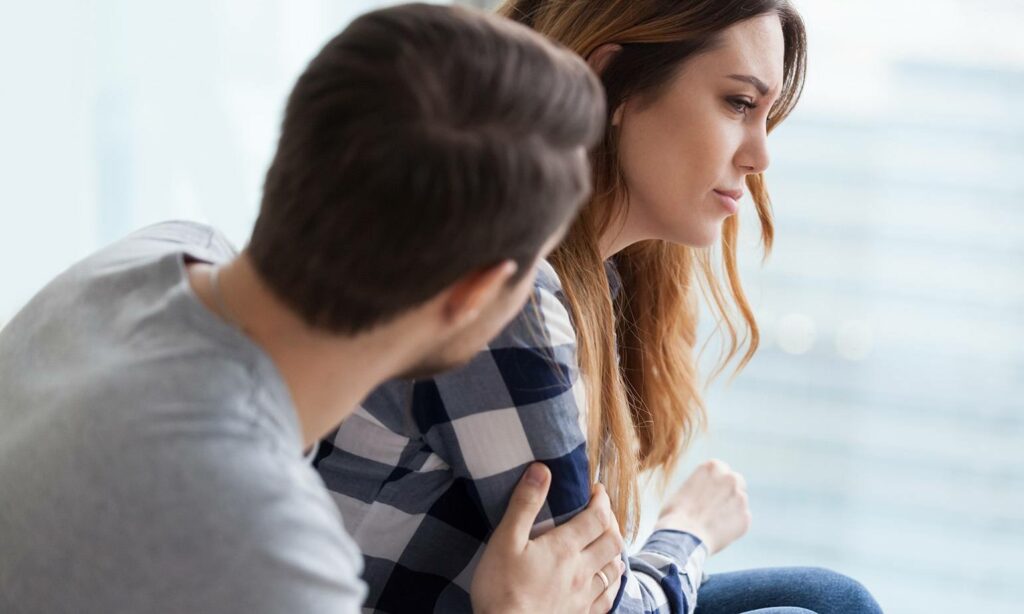Depression is a serious mental health condition that affects millions of people in the United States every year. If you are experiencing symptoms of depression, it is important to get help from a professional. This blog post will discuss some common signs and symptoms of depression, as well as how to get help if you think you might be suffering from this condition.
Contents
What Is Depression?
 Depression is more than just feeling blue or down in the dumps. It’s a serious medical condition that causes intense, persistent sadness and can lead to physical problems. Depression is one of the most common mental disorders in the United States, affecting more than 16 million adults each year.
Depression is more than just feeling blue or down in the dumps. It’s a serious medical condition that causes intense, persistent sadness and can lead to physical problems. Depression is one of the most common mental disorders in the United States, affecting more than 16 million adults each year.
There are different types of depression, and it can range from mild to severe. Major depressive disorder, also known as clinical depression, is the most common type of depression. It can cause severe symptoms that interfere with your ability to work and daily activities.
It is important to remember that depression is a real medical condition that is treatable. If you are experiencing any of the symptoms listed below, it’s important to talk to your doctor or mental health professional. it might be difficult to take that first step, but getting help can make a big difference.
How To Know If I am Depressed?
People with depression might not want to admit it. They might not want to believe that they have a problem. But depression is very real, and it can be extremely debilitating. If you’re wondering whether or not you might be suffering from depression, here are some signs to look out for:
Loss of interest
This is one of the first signs of depression. When you no longer enjoy activities that you used to find pleasurable, it’s a sign that something is wrong. This loss of interest can manifest itself in many different ways. Maybe you don’t want to see your friends anymore. Or, maybe you’ve lost interest in sex. Maybe you just don’t care about anything anymore. This can be a very frightening feeling, and it’s often one of the things that lead people to seek help.
Fatigue
Depression can make you feel exhausted all the time, even if you don’t do anything strenuous. This fatigue can be mental as well as physical. It can be hard to concentrate and get things done when you’re feeling this way. Also, fatigue is a common symptom of many other illnesses, so it’s important to talk to your doctor if you’re feeling exhausted all the time.
Aches and pains
Depression can also manifest itself in physical ways. You may have aches and pains that don’t have a specific cause, or that are worse than what you would expect from a normal injury or illness. These aches and pains may not be helped by over-the-counter or prescription medications. You may also find yourself feeling more fatigued than usual, or struggling to concentrate or remember things.
Changes in sleep patterns
Depression can cause either insomnia or hypersomnia. Insomnia is when you have trouble falling asleep or staying asleep. Hypersomnia is when you sleep too much. Either way, these changes in sleep patterns can be a sign that something is wrong. For example, if you’ve always been a sound sleeper but now you can’t fall asleep no matter how tired you are, that’s a red flag.
Changes in appetite
If you’re depressed, you may lose your appetite or find that you’re eating more than usual. You may not feel like cooking or eating at all, and weight loss or gain can be a symptom of depression. More often, people who are depressed eat more comfort foods high in carbohydrates, which can lead to weight gain.
Loss of concentration
 Concentration is something that can be difficult for people who are depressed. They may have difficulty focusing on work, school, or other activities. This can lead to problems with productivity and may make it hard to complete tasks. For example, a person who is depressed may have trouble reading a book or following a conversation. And this is stated more when you’re under stress.
Concentration is something that can be difficult for people who are depressed. They may have difficulty focusing on work, school, or other activities. This can lead to problems with productivity and may make it hard to complete tasks. For example, a person who is depressed may have trouble reading a book or following a conversation. And this is stated more when you’re under stress.
So these are some common signs that you may face if you are feeling depressed. If you are experiencing any of these symptoms, it is important to reach out for help. Depression is a serious condition that can have a negative impact on every aspect of your life, but there is hope. With treatment, you can improve your mood and start to enjoy life again.
What Caused My Depression?
The causes of depression are varied and complex. It can develop from a combination of biological, psychological, and social factors. Let’s discuss each of these in turn.
Biological factors
There are many possible biological causes of depression. These include:
- A family history of depression. If your parents or other close relatives have suffered from depression, you may be more likely to develop it yourself.
- Certain medical conditions. Depression is more common in people who suffer from certain medical conditions, such as heart disease, cancer, and stroke.
- Certain medications. Some medications, such as those used to treat high blood pressure or pain, can cause depression as a side effect.
It is also worth noting that women are more likely to suffer from depression than men. This may be due to hormonal changes, such as those that occur during pregnancy or menopause.
Psychological factors
In addition to biological factors, there are also many psychological causes of depression. These include:
- Low self-esteem. People who have low self-esteem are more likely to be depressed.
- Negative thinking. People who tend to think negatively about themselves, their lives, and the world around them are more likely to be depressed.
- Lack of social support. People who lack social support from family, friends, or others are more likely to be depressed.
- Stressful life events. People who have experienced stressful life events, such as the death of a loved one, divorce, or job loss, are more likely to be depressed.
These are just some of the many psychological causes of depression. If you think you may be depressed, it’s important to talk to a doctor or mental health professional. They can help you make a diagnosis and develop a treatment plan.
Social factors
There are also some social factors that can contribute to depression. If you’re dealing with a lot of stress in your life, that can lead to depression. These include:
- Unemployment: It is very common for people who are unemployed to experience depression.
- Relationship problems: If you’re in a difficult or unhappy relationship, that can lead to depression.
- Social isolation: If you don’t have many friends or family members to support you, that can also lead to depression.
- Money troubles: It might not be surprising that money problems can cause depression. If you’re struggling to make ends meet, that can lead to a lot of stress and anxiety.
- Health problems: People who are dealing with health problems, either their own or a family member’s, are also at risk for depression.
These are some causes that make you feel, “I am depressed.” If you identify with any of these, it’s important to seek help. Depression is a serious condition that can have a major impact on your life. If you’re feeling depressed, please see a doctor or mental health professional. There are treatments available that can help you feel better.
How Is It Diagnosed?
 The diagnosis is not always easy. A lot of people may not even realize they are depressed. Depression is often confused with sadness or grief. It is important to remember that everyone feels sad or down sometimes. Depression is more than just a low mood – it’s a serious mental health condition that has an impact on both physical and psychological well-being.
The diagnosis is not always easy. A lot of people may not even realize they are depressed. Depression is often confused with sadness or grief. It is important to remember that everyone feels sad or down sometimes. Depression is more than just a low mood – it’s a serious mental health condition that has an impact on both physical and psychological well-being.
There are a number of different ways to diagnose depression. A medical doctor will usually start with a physical examination and ask about any medical history, family history, and current symptoms. They may also order blood tests to rule out other potential causes of the symptoms.
A mental health professional will likely use a structured clinical interview to assess for depression. This interview consists of questions about symptoms, duration, and severity. The mental health professional will also ask about any other mental health conditions, substance abuse, and life stressors.
Therefore, an accurate diagnosis requires a comprehensive assessment. Depression is a treatable condition, so if you are experiencing any of the above symptoms, please reach out to a mental health professional for help.
What Should I Do If I Am Depressed?
When you identify that you may be depressed, there are some things you can do to help yourself. Depression is a serious mental illness that can have devastating consequences if left untreated. So here are a few things to do if you think you may be depressed.
Educate yourself
If the symptoms of depression are causing you to feel down, anxious, or have low energy, it is important to learn as much as you can about the condition. This will help you to understand what you are feeling and why. It can also give you a better understanding of how to manage your symptoms. There are many excellent resources available, including books, websites, and support groups.
It is important to be informed about depression and its symptoms before making any decisions about your mental health. Talk to your doctor, read articles and books, or visit websites like this one to learn more. You should research all of the different types of treatment options that are available, as well as any risks or side effects associated with them.
Talk to someone
It can be helpful to talk to someone who understands what you are going through. This could be a friend, family member, therapist, or doctor. Talking to someone can help you to feel heard and understood. It can also provide you with support and advice. For instance, if you are feeling suicidal, talking to someone can help you to find the support and resources you need.
Make lifestyle changes
There are certain lifestyle changes that can help to ease the symptoms of depression. These include eating a healthy diet, getting regular exercise, and getting enough sleep. Making these changes can help to improve your mood and give you more energy. When you’re feeling depressed, it can be hard to make these changes. But even making small changes can make a big difference.
Keep a journal
If your heart says, “I am depressed” you may be right. But how can you tell for sure? One way to get a better sense of whether or not you are depressed is to keep a journal. Write down how you have been feeling each day. Note when your mood changes and what might have caused those changes. Also, make a note of anything that you do that makes you feel better or worse. This can be helpful in spotting patterns and may give you some clues about whether or not you are depressed.
Seek professional help
 There are many ways to get help if you think you might be depressed. Talk to your doctor, a counselor, or a therapist. They can give you an accurate diagnosis and talk to you about treatment options. If you don’t feel comfortable talking to someone in person, there are also many hotlines and online resources available.
There are many ways to get help if you think you might be depressed. Talk to your doctor, a counselor, or a therapist. They can give you an accurate diagnosis and talk to you about treatment options. If you don’t feel comfortable talking to someone in person, there are also many hotlines and online resources available.
Overall, these are some things you can do if you’re wondering, “I am depressed.” With these tips in mind, you can better assess your symptoms and get the help you need to start feeling better. Remember, depression is a serious illness that should not be taken lightly. If you think you may be depressed, please seek professional help.
Because depression is not something that goes away on its own, it is important to seek professional help if you think you may be depressed. There are many different types of treatment available, and a qualified mental health professional can help you determine which one is right for you.
Conclusion
In conclusion, when someone acclaims I am depressed they could be referring to a number of different things. It is important to seek professional help if you think you might be suffering from depression. Depression can manifest in many different ways, so it is important to be aware of the signs and symptoms.
A mental health professional can diagnose depression and help you develop a treatment plan. If you are depressed, treatment can help improve your mood and functioning. Treatment typically involves talk therapy, medication, or both. With treatment, most people with depression feel better.
For more tips and guidance, you can reach out to Therapy Mantra. The team of professional counselors is more than happy to help you in your journey to recovery. Contact us today to learn more about our services. You can also book an online therapy session or download our free Android or iOS app.


